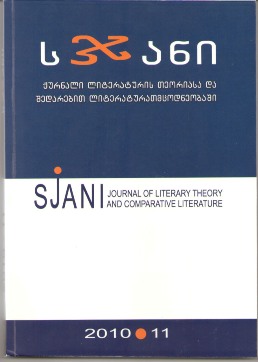„გაუმარჯოს გაგედას!“ ინტერპრეტაციები თემაზე: ლინგვოკულტუროლოგია; კულტურათშორისი კომუნიკაცია; კროსკულტურული ლინგვისტიკა
“Long Live Understanding!”Interpretations on the Themes: Linguo-Culturology, Inter-Cultural Communication, Cross-Cultural Linguistics, Cross-Cultural
Author(s): Irine ModebadzeSubject(s): Cultural Essay, Political Essay, Societal Essay
Published by: ლიტერატურის ინსტიტუტის გამომცემლობა
Keywords: translation; inter-cultural communication; linguo-culturology; cross-cultural dialogue.
Summary/Abstract: Native tongue serves as means for conceptualization of the outer world. It is characterized by two-sided dynamics: it reflects basic values (The image of world) and simultaneously affects their formation. If citing Paul Ricoeur there exist a close relationship between a particular language and the rules of thinking: language reflects the cultural values, ideals, moods, perception of the world” (Ricoeur 1995: 19). No matter how many languages a person can speak, as a rule, he uses the mental constructions within the frameworks of his native language paradigm. Therefore, if ambiguity follows the “track” which is left in language, it is obvious, that those “tracks” will be different in various ethnic languages. What remains “from these tracks” in translation? To what extend is it possible to maintain the ambiguity of thinking? To what extend is it possible to translate the various meanings of the “utterance” (either written or oral) and present their adequate alternative in another culture? Practitioners and theoreticians of translation are striving to find answer to these questions, they organize international conferences and round-table discussions, analyze the results obtained in interdisciplinary branches. In the paradigm of “language-culture” problem priority is given to the study of cultural characteristics revealed in the language. The interest towards mutual influence and mutual merging has increased in recent years. The article analyses and discusses the modern theoretical reconsideration-evaluation of translation and inter-cultural communication challenges in the triad paradigm “language-culture-identity”. The 21st century is considered as the period of re-evaluating values. Under the conditions of globalization and the development of informative technologies priority is given to relation (communication) between culture and its separate representatives. If globalization, unity-merging of local cultural experiences, is the only means for achieving mutual-understanding, translation is granted a crucial function: it determines what amount of our cultural heritage will be included in world heritage and how Georgian language and culture will be echoed in polyphonic world harmony.
Journal: სჯანი
- Issue Year: 2010
- Issue No: 11
- Page Range: 128-134
- Page Count: 7
- Language: Georgian

